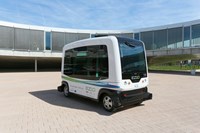
WEpods brings self-driving transport closer
Over the past year, the WEpods project has given a face to innovation, knowledge institutions and collaborations between companies, government bodies and knowledge institutions in the FoodValley region. In the Netherlands, the WEpods have put the subject of ‘self-driving public transport’ firmly on the map. The initial results of the trial were presented at the Future Mobility Event on 7 December. Self-driving transport certainly has a future. Within a few years, it will even be possible to operate this kind of transport commercially in less busy areas and at specific times.
Faster introduction of self-driving public transport
Self-driving public transport can now be introduced twice as fast thanks to the technical development of the WEpods. Delft University of Technology and its partners in particular, but also dozens of students, have contributed to this development. The WEpods gradually learned the route on the Wageningen Campus and to Ede-Wageningen train station. This was possible as engineers mapped the route in great detail, allowing the WEpods to follow a straight, fixed line through the streets they were navigating. The team also developed a smart sensor system with lasers, radars and cameras which allows the WEpod to anticipate other traffic more effectively and distinguish a person from other objects such as a branch, for example. This includes self-learning software to ensure that the WEpods become smarter as time goes by.
A system for the operator in the Control Room has also been developed, together with an infotainment system in the vehicle and an app for booking a trip.
Trial also leads to new questions
The trial also revealed various other issues. These include legislation and regulations, cross-border self-driving public transport, human behaviour and ethical issues. Various obstacles and setbacks were also encountered during the trial. A great deal was learned a result and new aspects and features were developed accordingly.
Deputy Conny Bieze: “I am satisfied with the trial. As this point, self-driving transport is certainly not something which can be taken for granted but we can see possible applications in the future. Thanks to good collaboration between so many parties, we have really managed to make a difference in Gelderland and trigger plenty of discussions”.
Driverless vehicles
Many initiatives which contribute to the future of automatic driving have been developed all over the world. Most work on the basis of a passenger car or truck with a driver. The vehicle then gradually takes over more tasks from the driver. The WEpods project involves public transport and started on the other side of the spectrum: complete automation, with no driver and no private owner. What makes the WEpod unique is the fact that the vehicle does not have a steering wheel or pedals and drives among the normal traffic on the public roads. The WEpod has already been driving completely autonomously and without a single accident since April, on the public roads at Wageningen University & Research.
Public reactions
Since February, the WEpod has regularly been transporting guests across the Wageningen Campus. In June, official permission was given to transport the general public and special demo trips and open days were organised to introduce a wider audience to self-driving transport. Public reactions are generally surprised, enthusiastic and positive. A steward also travels in the vehicle to ensure safety and because this is compulsory under Dutch law, certainly until 2019. From October, the route between the Wageningen Campus and Ede station was tested and since November, the WEpod has been used as a bus service on the Campus every Tuesday.
Future
The WEpods trial started over a year ago and the province is the main investor and driving force behind the project. Now that the initial phase of development is complete, this will be followed by a comprehensive evaluation and the partners will also look at the possibilities for extending the trial for several more years in conjunction with businesses and knowledge institutions. More will be known about this at the end of December/beginning of January.
About WEpods
Something unique is about to unfold in the Province of Gelderland. For the first time worldwide, self-driving vehicles called WEpods are about to take to the public road. There are already self-driving vehicles such as the Rotterdam Rivium shuttle bus and the Heathrow shuttles in London, but those vehicles operate on dedicated lanes. In Gelderland, the WEpods will be mixing with regular traffic.
This innovative pilot is an initiative of the Province of Gelderland. The WEpods will be circulating between Ede-Wageningen railway station and Wageningen University & Research centre (WUR), as well as on the WUR campus.




Comments
There are no comments yet for this item
Join the discussion